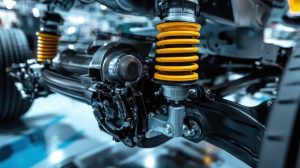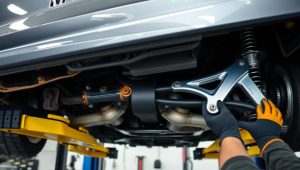When it comes to vehicle performance, fuel efficiency is often the focal point. However, many drivers overlook the significant role that suspension springs play in influencing fuel consumption. These components, primarily responsible for absorbing shocks and maintaining tire contact with the road, can impact how efficiently your vehicle uses fuel. In this article, we’ll explore the connection between suspension springs and fuel efficiency, delving into how they affect ride quality, handling, and ultimately, your vehicle’s fuel economy.

Understanding Suspension Springs
Suspension springs are integral parts of a vehicle’s suspension system. They support the vehicle’s weight, absorb road shocks, and maintain tire contact with the road surface. There are several types of suspension springs, each with unique characteristics:
-
Coil Springs: Spiral-shaped springs that provide a smooth ride by absorbing road irregularities.
-
Leaf Springs: Long, flat springs that offer durability and are commonly used in heavy-duty vehicles.
-
Torsion Bars: Twisted bars that resist rotational forces, providing a compact and adjustable suspension solution.
-
Air Springs: Flexible rubber bladders filled with air, offering adjustable ride height and load capacity.
How Suspension Springs Influence Fuel Efficiency
The condition and design of suspension springs can significantly impact fuel efficiency in various ways:
1. Ride Height and Aerodynamics
Suspension springs determine the ride height of a vehicle. A higher ride height increases aerodynamic drag, requiring more engine power to maintain speed. Conversely, a lower ride height can reduce drag but may compromise ground clearance and ride comfort. Maintaining an optimal ride height ensures better fuel efficiency without sacrificing vehicle performance.
2. Weight Distribution and Handling
Springs affect how weight is distributed across the vehicle. Proper weight distribution ensures balanced handling and efficient power delivery. Uneven weight distribution can lead to increased rolling resistance and inefficient fuel use.
3. Damping and Tire Contact
The ability of suspension springs to absorb shocks affects tire contact with the road. Poor shock absorption can lead to inconsistent tire contact, increasing rolling resistance and reducing fuel efficiency.
Factors Affecting Suspension Spring Performance
Several factors can influence the performance of suspension springs and, consequently, fuel efficiency:
-
Spring Material: High-quality materials like chrome vanadium steel offer better durability and performance.
-
Spring Design: Advanced designs can provide better shock absorption and weight distribution.
-
Vehicle Load: Overloading a vehicle can cause springs to compress excessively, affecting performance.
-
Road Conditions: Driving on rough terrains can wear out springs faster, leading to decreased efficiency.
Optimizing Suspension Springs for Better Fuel Economy
To enhance fuel efficiency through suspension system optimization:
-
Regular Maintenance: Inspect and replace worn-out springs to maintain optimal performance.
-
Appropriate Load Management: Avoid overloading your vehicle to prevent excessive spring compression.
-
Upgrade to High-Quality Springs: Invest in advanced spring designs that offer better shock absorption and weight distribution.
-
Adjust Ride Height: Maintain an optimal ride height to reduce aerodynamic drag without compromising vehicle performance.
Suspension Springs vs. Fuel Efficiency: A Comparative Overview
| Suspension Spring Type | Impact on Fuel Efficiency | Pros | Cons |
|---|---|---|---|
| Coil Springs | Moderate | Smooth ride, cost-effective | May wear out faster under heavy loads |
| Leaf Springs | Low | Durable, simple design | Less effective shock absorption |
| Torsion Bars | High | Compact, adjustable | Can be complex to maintain |
| Air Springs | High | Adjustable ride height, excellent shock absorption | Expensive, requires maintenance |
Enhance Your Vehicle’s Performance

Optimizing your vehicle’s suspension system can lead to improved fuel efficiency and overall performance. If you’re looking to upgrade or replace your suspension springs, consider exploring high-quality options available online. Buy Springs & Components online to find products that suit your vehicle’s needs.
Conclusion
While often overlooked, suspension springs play a crucial role in determining a vehicle’s fuel efficiency. By understanding their impact and taking steps to optimize their performance, drivers can enjoy better fuel economy and enhanced vehicle performance. Regular maintenance, appropriate load management, and investing in high-quality springs are key to achieving these benefits.